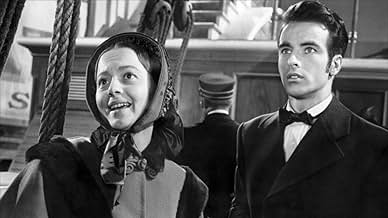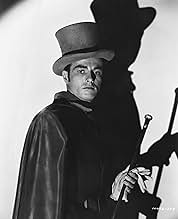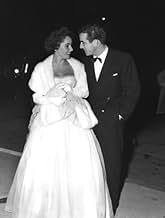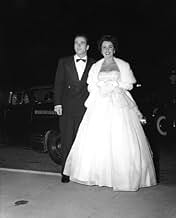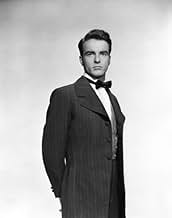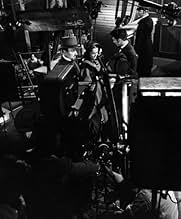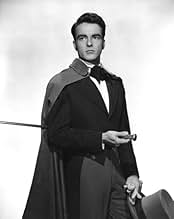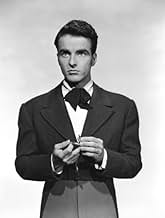NOTE IMDb
8,1/10
18 k
MA NOTE
Une jeune femme naïve tombe amoureuse d'un beau jeune homme, mais son père, qui la maltraite psychologiquement, le soupçonne d'être un coureur de dot.Une jeune femme naïve tombe amoureuse d'un beau jeune homme, mais son père, qui la maltraite psychologiquement, le soupçonne d'être un coureur de dot.Une jeune femme naïve tombe amoureuse d'un beau jeune homme, mais son père, qui la maltraite psychologiquement, le soupçonne d'être un coureur de dot.
- Réalisation
- Scénario
- Casting principal
- Récompensé par 4 Oscars
- 13 victoires et 9 nominations au total
Mary Bayless
- Party Guest
- (non crédité)
Nan Boardman
- French Maid
- (non crédité)
Jack Chefe
- French Waiter
- (non crédité)
Marcel De la Brosse
- French Porter
- (non crédité)
Ray De Ravenne
- French Waiter
- (non crédité)
Avis à la une
Henry James novel of spinster daughter of wealthy doctor being wooed by a fortune hunter is meticulously brought to the screen by Wyler and a stellar cast. The beautiful de Havilland, made to look plain and dull, is quite good in her Oscar-winning title role. Also fine are Clift as the gold digger and Hopkins as de Havilland's understanding aunt. However, the best performance is given by Richardson as the cold, domineering father who wants to protect his daughter but also despises her meek existence. Brown, who plays the maid, looks like a young Grace Kelly. The cinematography is excellent and there's a fine score by Copland.
I saw this film about 10 years ago and have never forgotten it. Why it is not available on DVD - I just don't understand it.
Olivia de Havilland is heart-breaking as the woman who is so badly treated by her suitors and her father. I felt the portrayal of her father and the cruel way he treats her was so well played out and you could see how her soul is slowly being crushed.
I was so amazed and touched by the film, I went and got the book it is based on, Henry James' Washington Square. It was superb but nothing will make me forget the look on Olivia De Havilland's face at the end of the movie where you can see her features harden and all her youthful sweetness is gone.
Brilliant film!
Olivia de Havilland is heart-breaking as the woman who is so badly treated by her suitors and her father. I felt the portrayal of her father and the cruel way he treats her was so well played out and you could see how her soul is slowly being crushed.
I was so amazed and touched by the film, I went and got the book it is based on, Henry James' Washington Square. It was superb but nothing will make me forget the look on Olivia De Havilland's face at the end of the movie where you can see her features harden and all her youthful sweetness is gone.
Brilliant film!
10dglink
Certainly among the finest literary adaptations, "The Heiress" was based on Henry James's novel, "Washington Square" and features arguably Olivia de Havilland's finest screen performance. Morris Townsend , a handsome young man with ambiguous motives pursues Catherine Sloper, a plain spinster, who is slightly past marriageable age and possesses limited social skills. The young woman, who is the heiress of the title, is vulnerable prey for a penniless fortune hunter.
However, Montgomery Clift plays Townsend in an enigmatic manner, and viewers can debate his true intentions. Catherine's father, played by Ralph Richardson, and her Aunt Lavinia, played by Miriam Hopkins, take opposite sides in Townsend's pursuit of Catherine. Although both her father and her aunt appear to see through the handsome suitor, Aunt Lavinia is practical and sensitive to her niece's emotional needs, and she counsels compromise in pursuit of happiness, if only fleeting. However, Catherine's father is unyielding and essentially unloving in his opposition to the match. Throughout, Dr. Sloper compares his daughter's virtues to those of his late wife, and Catherine comes up lacking in every quality that he values. Sloper threatens to disinherit his daughter if she marries the suitor.
Montgomery Clift may appear shallow and transparent to some, but in essence those are the traits of his character. While Morris is slick and obviously fawning, he is not intelligent enough to be totally deceptive. Only someone as naive and needy as Olivia could fail to grasp that Morris may want something more than her love. Olivia de Havilland transcends her other performances and skillfully and convincingly evolves from a shy, introverted girl into a strong, vengeful woman. De Havilland has often portrayed women who appear genteel and soft on the outside, but whose hearts and backbones can harden into pure steel (e.g. Gone with the Wind; Hush, Hush, Sweet Charlotte), and Catherine Sloper is the finest of those roles. With able support from Richardson and Hopkins, Clift and de Havilland make the most of an outstanding screenplay, which was adapted from a stage play. William Wyler directs with a sure hand, and the atmospheric cinematography captures 19th century New York life. Period films are often unraveled by their hairstyles, which generally owe more to the year in which the film was made rather than that in which the story is set. However, even the coiffures excel in "The Heiress." De Havilland's hair looks authentic 19th century and underscores Wyler's fastidious attention to detail.
With an award-winning de Havilland performance, a handsome Montgomery Clift on the brink of stardom, and an engrossing Henry James story, "The Heiress" is one of the finest films of the 1940's. Without qualification, the film holds up to and merits repeat viewings if only to better argue the underlying motives of Clift and the fateful decision that de Havilland has to make.
However, Montgomery Clift plays Townsend in an enigmatic manner, and viewers can debate his true intentions. Catherine's father, played by Ralph Richardson, and her Aunt Lavinia, played by Miriam Hopkins, take opposite sides in Townsend's pursuit of Catherine. Although both her father and her aunt appear to see through the handsome suitor, Aunt Lavinia is practical and sensitive to her niece's emotional needs, and she counsels compromise in pursuit of happiness, if only fleeting. However, Catherine's father is unyielding and essentially unloving in his opposition to the match. Throughout, Dr. Sloper compares his daughter's virtues to those of his late wife, and Catherine comes up lacking in every quality that he values. Sloper threatens to disinherit his daughter if she marries the suitor.
Montgomery Clift may appear shallow and transparent to some, but in essence those are the traits of his character. While Morris is slick and obviously fawning, he is not intelligent enough to be totally deceptive. Only someone as naive and needy as Olivia could fail to grasp that Morris may want something more than her love. Olivia de Havilland transcends her other performances and skillfully and convincingly evolves from a shy, introverted girl into a strong, vengeful woman. De Havilland has often portrayed women who appear genteel and soft on the outside, but whose hearts and backbones can harden into pure steel (e.g. Gone with the Wind; Hush, Hush, Sweet Charlotte), and Catherine Sloper is the finest of those roles. With able support from Richardson and Hopkins, Clift and de Havilland make the most of an outstanding screenplay, which was adapted from a stage play. William Wyler directs with a sure hand, and the atmospheric cinematography captures 19th century New York life. Period films are often unraveled by their hairstyles, which generally owe more to the year in which the film was made rather than that in which the story is set. However, even the coiffures excel in "The Heiress." De Havilland's hair looks authentic 19th century and underscores Wyler's fastidious attention to detail.
With an award-winning de Havilland performance, a handsome Montgomery Clift on the brink of stardom, and an engrossing Henry James story, "The Heiress" is one of the finest films of the 1940's. Without qualification, the film holds up to and merits repeat viewings if only to better argue the underlying motives of Clift and the fateful decision that de Havilland has to make.
What a lavish history of films we are fortunate enough to have in this country. And I count "The Heiress" as one of the best. Combine a wonderfully told story with a masterful director (William Wyler), and add to that superb cast, and you have the formula for a masterpiece as we do here.
Olivia de Havilland gives the performance of her life as Catherine Sloper, the socially awkward and homely daughter of surgeon Dr. Sloper (played by Ralph Richardson). She brings such a strong performance as her character evolves from a timid, shy and innocent young lady to a hardened, disappointed and bitter woman. I don't know that I have ever seen an actress give such a convincing evolution, before or since. She truly earned her Oscar win for Best Actress. Richardson also delivers a believable performance as the ruthless father that is extremely disappointed in his daughter, and never fails to let her know it. At the same time, there is a hint of fatherly love below the surface trying to protect his daughter from what he perceives is a fortune hunter in the suitor of Montgomery Clift's character, Morris Townsend.
The photography in the film is amazing as it conveys the deep emotions in the film so adequately. You feel Catherine's loneliness and awkwardness, and the scenes involving the elopement, and later the final rejection, are quite hauntingly portrayed.
One of my favorite lines in movies is from this film when Catherine's Aunt tells her "Can you be so cruel?" to which Catherine coldly replies "Yes, I can be very cruel. I have been taught by masters." This is a film you will want to see multiple times to uncover all the layers and details of the very deep and tragic story of "The Heiress".
Olivia de Havilland gives the performance of her life as Catherine Sloper, the socially awkward and homely daughter of surgeon Dr. Sloper (played by Ralph Richardson). She brings such a strong performance as her character evolves from a timid, shy and innocent young lady to a hardened, disappointed and bitter woman. I don't know that I have ever seen an actress give such a convincing evolution, before or since. She truly earned her Oscar win for Best Actress. Richardson also delivers a believable performance as the ruthless father that is extremely disappointed in his daughter, and never fails to let her know it. At the same time, there is a hint of fatherly love below the surface trying to protect his daughter from what he perceives is a fortune hunter in the suitor of Montgomery Clift's character, Morris Townsend.
The photography in the film is amazing as it conveys the deep emotions in the film so adequately. You feel Catherine's loneliness and awkwardness, and the scenes involving the elopement, and later the final rejection, are quite hauntingly portrayed.
One of my favorite lines in movies is from this film when Catherine's Aunt tells her "Can you be so cruel?" to which Catherine coldly replies "Yes, I can be very cruel. I have been taught by masters." This is a film you will want to see multiple times to uncover all the layers and details of the very deep and tragic story of "The Heiress".
The Heiress (1949)
Another gem from William Wyler. This is the director of so many sparkling, flawless interpersonal dramas it's hard to believe he isn't lionized alongside more famous greats. The problem (as he admits in interviews) is he had no real style of his own. And yet, as the years go by, his "style" begins to clarify a little. Watch "The Little Foxes" or "Detective Story" or this one, "The Heiress," and you'll see an astonishing, complex handling of a small group of people with visual clarity and emotional finesse.
There is no overacting here, and no photographic flourishes to make you gasp. There are no murky shadows or gunfights or even ranting and raving. No excess. What you have here is terrific writing (thanks in part to Henry James who wrote the source story, Washington Square) and terrific acting.
The three leads are all first rate actors, surely. Montgomery Clift a young and rising star, Olivia de Havilland already famous for earlier roles (including a supporting one in "Gone with the Wind"), and the terrific stage actor Ralph Richardson, who received an Oscar nomination for his role. It is de Haviland who is the heiress of the title, and she does tend to steal the show with a performance that you would think would tip into campy excess but which just veers this side of danger and makes you feel for her scene after scene. And she took the Best Actress award for it.
A good director manages to bring the best from the actors, which Wyler clearly does. But he also finds ways to make those performances jump out of the film reality into the movie theater. His fluid, expert way of moving actors around one another, of having them trade positions or look this way or that as they deliver some intensely subtle comeback line, is really astonishing. And easy to miss, I think, if you just get absorbed in the plot. So watch it all.
The story itself is pretty chilling and oddly dramatic (dramatic for Henry James, not for Wyler, who likes a kind of soap opera drama within all his focused restraint). The heiress (de Havilland) is being pursued by a fortune hunting and rather handsome man (Clift) and she doesn't realize his love isn't for real. But the father, with his slightly cruel superiority, sees it all and tries to subtly maneuver his daughter to safety. The result is a lot of heartbreak and surprising twists of motivation.
By the end almost anything can happen, within this upper class world of manners and appropriate reactions, and de Havilland rises to the challenge. It's worth seeing how. Terrific stuff from the golden age of the silver screen, for sure.
Another gem from William Wyler. This is the director of so many sparkling, flawless interpersonal dramas it's hard to believe he isn't lionized alongside more famous greats. The problem (as he admits in interviews) is he had no real style of his own. And yet, as the years go by, his "style" begins to clarify a little. Watch "The Little Foxes" or "Detective Story" or this one, "The Heiress," and you'll see an astonishing, complex handling of a small group of people with visual clarity and emotional finesse.
There is no overacting here, and no photographic flourishes to make you gasp. There are no murky shadows or gunfights or even ranting and raving. No excess. What you have here is terrific writing (thanks in part to Henry James who wrote the source story, Washington Square) and terrific acting.
The three leads are all first rate actors, surely. Montgomery Clift a young and rising star, Olivia de Havilland already famous for earlier roles (including a supporting one in "Gone with the Wind"), and the terrific stage actor Ralph Richardson, who received an Oscar nomination for his role. It is de Haviland who is the heiress of the title, and she does tend to steal the show with a performance that you would think would tip into campy excess but which just veers this side of danger and makes you feel for her scene after scene. And she took the Best Actress award for it.
A good director manages to bring the best from the actors, which Wyler clearly does. But he also finds ways to make those performances jump out of the film reality into the movie theater. His fluid, expert way of moving actors around one another, of having them trade positions or look this way or that as they deliver some intensely subtle comeback line, is really astonishing. And easy to miss, I think, if you just get absorbed in the plot. So watch it all.
The story itself is pretty chilling and oddly dramatic (dramatic for Henry James, not for Wyler, who likes a kind of soap opera drama within all his focused restraint). The heiress (de Havilland) is being pursued by a fortune hunting and rather handsome man (Clift) and she doesn't realize his love isn't for real. But the father, with his slightly cruel superiority, sees it all and tries to subtly maneuver his daughter to safety. The result is a lot of heartbreak and surprising twists of motivation.
By the end almost anything can happen, within this upper class world of manners and appropriate reactions, and de Havilland rises to the challenge. It's worth seeing how. Terrific stuff from the golden age of the silver screen, for sure.
Le saviez-vous
- AnecdotesDirector William Wyler shot 37 takes of Olivia de Havilland carrying her suitcases up the stairs. Only after the final shoot, whereupon she briefly stopped on the second flight of stairs and leaned on the handrail for a couple of seconds, did Wyler declare that this was the take he wanted to print.
- GaffesThis story takes place at the end of the 1840s, but none of the men wear the cravats--material bound around the neck and tied in either the front or back--that were fashionable in that period; instead they wear neckties and bow ties, which did not come into fashion until the late 1850s.
- Citations
Aunt Penniman: Can you be so cruel?
Catherine Sloper: Yes, I can be very cruel. I have been taught by masters.
- ConnexionsFeatured in AFI Life Achievement Award: A Tribute to William Wyler (1976)
Meilleurs choix
Connectez-vous pour évaluer et suivre la liste de favoris afin de recevoir des recommandations personnalisées
Détails
- Date de sortie
- Pays d’origine
- Langues
- Aussi connu sous le nom de
- La heredera
- Lieux de tournage
- Société de production
- Voir plus de crédits d'entreprise sur IMDbPro
Box-office
- Budget
- 2 600 000 $US (estimé)
- Montant brut mondial
- 158 $US
- Durée
- 1h 55min(115 min)
- Couleur
- Rapport de forme
- 1.37 : 1
Contribuer à cette page
Suggérer une modification ou ajouter du contenu manquant


